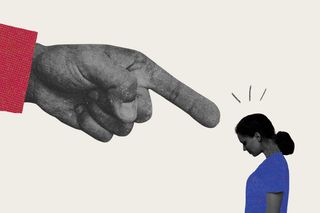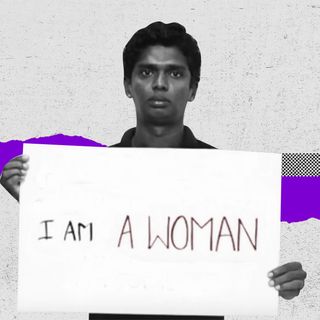
9 in 10 Indians Believe Wife Must Always ‘Obey’ Husband, Finds New Survey
Moreover, 80% of people agree that “when there are few jobs, men should have more rights to a job than women.”

It is very important for women to have the same rights as men — that seems to be the widely held view among Indians surveyed for a global study on gender attitudes. But according to the Indians surveyed, it is alsookay for men to be favored or toassert their privilege in some situations; like allowing them off the hook for child care or prioritizing men’s access to jobs over women’s.
These are the findings of a new Pew Research Center report released on Wednesday, outlining how Indians view gender roles within homes and society. The study was conducted before the pandemic, between late 2019 and early 2020, and included interviews with 29,999 Indians across most states and union territories (except Manipur, Sikkim, Lakshadweep, the Andaman and Nicobar Islands, and Kashmir). The conversations were conducted face-to-face in 17 local languages.
The resounding conclusion feels intuitive — compared to other nations, Indians have a more conservative view of gender roles in society. But the survey spotlights an ideological disparity between holding progressive views whilst conforming to traditional values.
For instance, people agreed that women and men make equally good political leaders; 14% also believed that women generally make better leaders than men. The report cited popular women political leaders like Indira Gandhi, Mamata Banerjee, Jayalalitha, and Sushma Swaraj. But this confidence in women’s competence in the public sphere doesn’t quite translate within family settings — there, participants believe men should play a more prominent role in the home as well as society. Sample this number: 80% of people agree that “when there are few jobs, men should have more rights to a job than women.”
Or when asked: “Which kind of marriage is more satisfying, one where the husband provides for the family and wife takes care of the house and children, or one where the husband and wife both have jobs and together take care of the house and children?” Indians were more likely to pick the former —that is, they were more comfortable with a traditional set-up of a family. While 54% of Indians say both men and women in families should be responsible for overall livelihood, many (43%) see family income as an obligation reserved for men only.
The slim majority does little to hide the ingrained patriarchy at play. The old chestnut — of a “man’s job is to earn money and provide for his family” and woman should “look after the family” and be caregivers only — lives through tradition and values. This indubitably impacts men and women in how they exercise their identity and freedom in society.
Related on The Swaddle:
Pandemic Isolation Intensified Gender Roles — and Women’s Anxiety, Depression: Study
Naturally, the belief that men should receive preferential treatment when it comes to jobs or taking charge permeates into other spheres too. Nearly nine-in-ten Indians end up agreeing with the idea that a “wife must always obey her husband.” And this is not a view dominantly held by men; most Indian women (almost 61% of them) alsoagree with this “ultimate deference for husband” sentiment. “Indian women typically are not much more likely than Indian men to express egalitarian views on gender roles,” as the report explained.
This aspect is not particularly surprising; we know women, just like others, are likely to maintain patriarchal views and perpetuate these beliefs. In December last year, a national survey found 84% of women in Andhra Pradesh said it was okay for husbands to beat their wives if they digress from traditional roles. Lack of financial independence, embedded social values (that a woman’s place is beside her husband only), lack of education, lack of social support systems all create conditions where women may internalize the misogyny too and recreate conditions of oppression — knowingly or unknowingly.
In her 1988 article “Bargaining with Patriarchy,” Turkish author and researcher Deniz Kandiyoti spoke of the contradictory expectations women conform to in a society. Naturally, these bargains mean women are pressured into internalizing patriarchal ideologies. “Even if some of these bargains are ‘easy’ for women to make — even if they do not bring immediate harm to women’s own lives or if they make an individual woman’s life easier in the short term — it reinforces a system of oppression for all women. There is an individual gain, but a collective loss,” a blog explained.
Arguably, these findings vary across geography. Respondents from the southern states were more likely to express traditional ideas towards familial responsibilities (for instance, they agree men should earn money in a family) when compared to people living in Hindi-speaking states. But at the same time, respondents from Tamil Nadu were least likely to say a wife must obey her husband. So there is no one broad stroke trend that prevails across the country.
Related on The Swaddle:
Interestingly, “despite broadly aligning with global public opinion on equal rights for women,” the report noted, “Indians tend to be more conservative than people in most other countries surveyed when it comes to gender dynamics in the home and in the economy.” This puts into context the preferential treatment meted out to men when it comes to having a job, or being put on a pedestal within households. Even in terms of child care, 62% of people believe both men and women should be responsible for child care; but 34% were convinced that women should primarily handle this duty because these are the traditional ways of the world.
The belief that men deserve to be in the workforce, or be relieved of home responsibilities, has a chilling effect on women’s agency. Such an attitude, combined with a scarcity of jobs, could explain “why India has one of the world’s lowest rates of female labor force participation.”
This survey was conducted before the pandemic barreled through Indian states. Multiple research works since then have highlighted how severely women have been pushed out of the workforce and threatened their emotional, mental, and physical safety. A 2021 study found how the pandemic has further intensified gender roles. “Women are the ones who carry the additional load. Taking care of family and critical situations has always been a huge load on women and females,” Giuseppe Iaria, a professor of psychology at the University of Calgary and co-author of the study, said in a statement.
How Indians perceive family responsibility, care work, reproductive rights, and gender roles is an ever-evolving outlook. But the current findings offer a window into the tussle between egalitarian ideas and traditional mores — a tightrope that is almost always placed a little too high for women.
Saumya Kalia is an Associate Editor at The Swaddle. Her journalism and writing explore issues of social justice, digital sub-cultures, media ecosystem, literature, and memory as they cut across socio-cultural periods. You can reach her at @Saumya_Kalia.
Related


Chennai Athlete Asked for a ‘Gender Certificate’ From Police Officials
